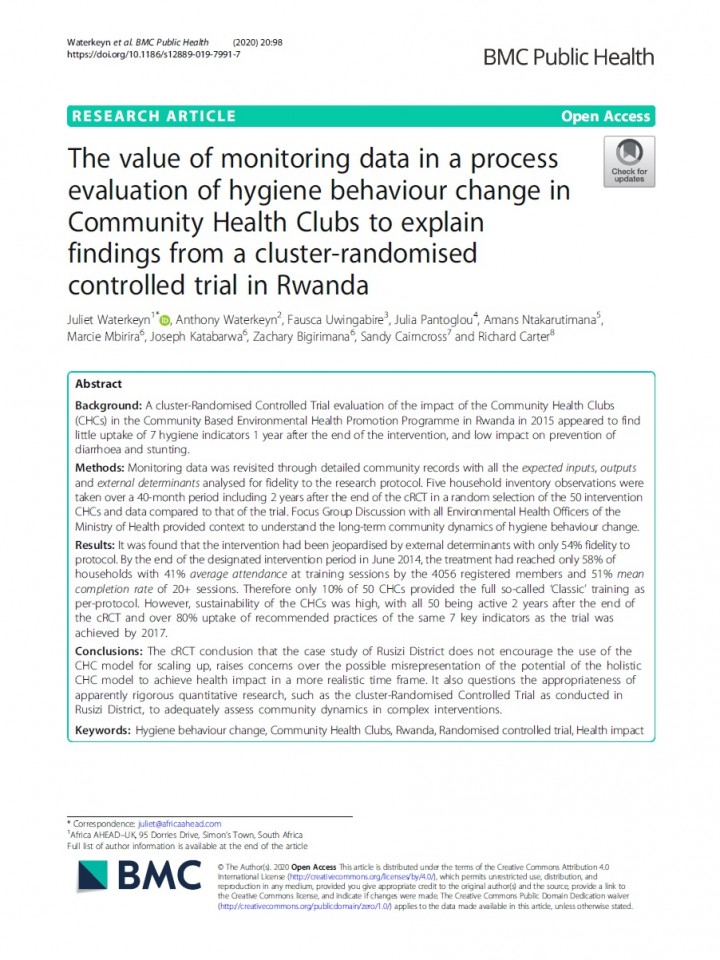The Value of Monitoring Data in a Process Evaluation of Hygiene Behaviour Change in Community Health Clubs to Explain Findings from a Cluster-Randomised Controlled Trial in Rwanda
Waterkeyn, J., Waterkeyn, A., Uwingabire, F., Pantoglou, J., Ntakarutimana, A., Mbirira, M., Katabarwa, J., Bigirimana, Z., Cairncross, S., Carter, R. (2020)

Published in: 2020
Pages: 16
Publisher:
BMC Public Health
Author:
Waterkeyn, J., Waterkeyn, A., Uwingabire, F., Pantoglou, J., Ntakarutimana, A., Mbirira, M., Katabarwa, J., Bigirimana, Z., Cairncross, S., Carter, R.
Uploaded by:
SuSanA Admin
Partner profile:
common upload
819 Views
2 Downloads
Background:
A cluster-Randomised Controlled Trial evaluation of the impact of the Community Health Clubs (CHCs) in the Community Based Environmental Health Promotion Programme in Rwanda in 2015 appeared to find little uptake of 7 hygiene indicators 1 year after the end of the intervention, and low impact on prevention of diarrhoea and stunting.
Methods:
Monitoring data was revisited through detailed community records with all the expected inputs, outputs and external determinants analysed for fidelity to the research protocol. Five household inventory observations were taken over a 40-month period including 2 years after the end of the cRCT in a random selection of the 50 intervention CHCs and data compared to that of the trial. Focus Group Discussion with all Environmental Health Officers of the Ministry of Health provided context to understand the long-term community dynamics of hygiene behaviour change.
Results:
It was found that the intervention had been jeopardised by external determinants with only 54% fidelity to protocol. By the end of the designated intervention period in June 2014, the treatment had reached only 58% of households with 41% average attendance at training sessions by the 4056 registered members and 51% mean completion rate of 20+ sessions. Therefore only 10% of 50 CHCs provided the full so-called ‘Classic’ training as per-protocol. However, sustainability of the CHCs was high, with all 50 being active 2 years after the end of the cRCT and over 80% uptake of recommended practices of the same 7 key indicators as the trial was achieved by 2017.
Conclusions:
The cRCT conclusion that the case study of Rusizi District does not encourage the use of the CHC model for scaling up, raises concerns over the possible misrepresentation of the potential of the holistic CHC model to achieve health impact in a more realistic time frame. It also questions the appropriateness of apparently rigorous quantitative research, such as the cluster-Randomised Controlled Trial as conducted in Rusizi District, to adequately assess community dynamics in complex interventions.
Bibliographic information
Waterkeyn, J., Waterkeyn, A., Uwingabire, F., Pantoglou, J., Ntakarutimana, A., Mbirira, M., Katabarwa, J., Bigirimana, Z., Cairncross, S., Carter, R. (2020). The Value of Monitoring Data in a Process Evaluation of Hygiene Behaviour Change in Community Health Clubs to Explain Findings from a Cluster-Randomised Controlled Trial in Rwanda. BMC Public Health
Filter tags
English














